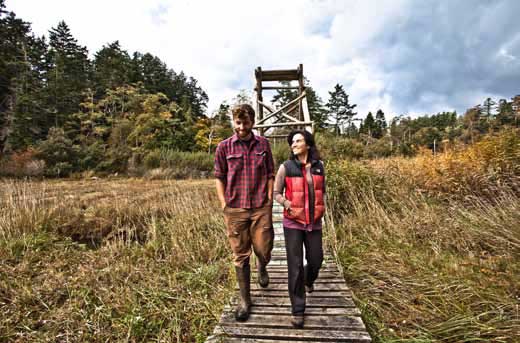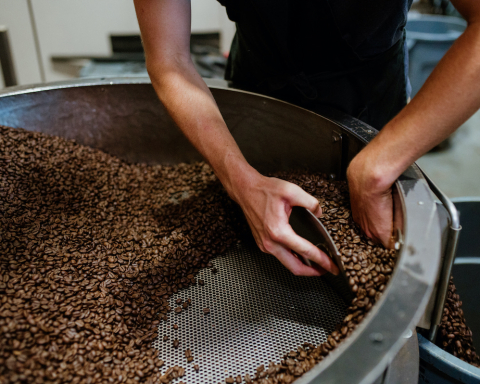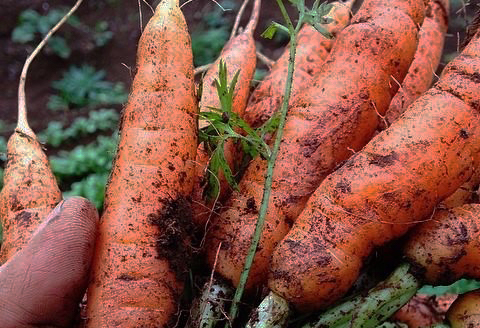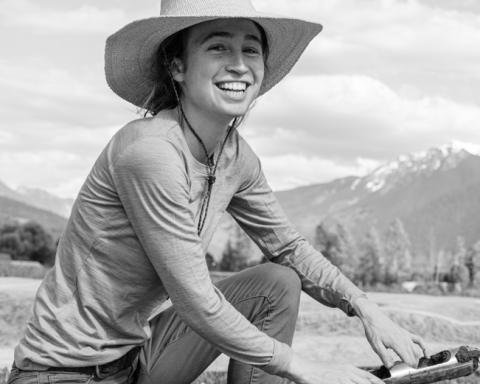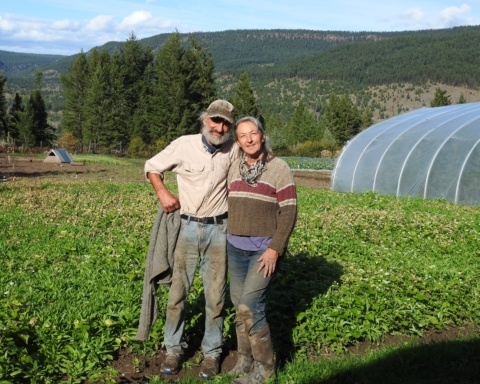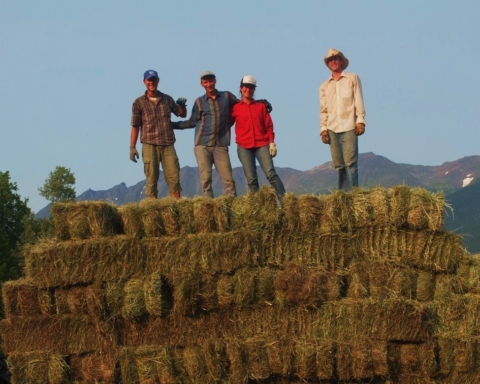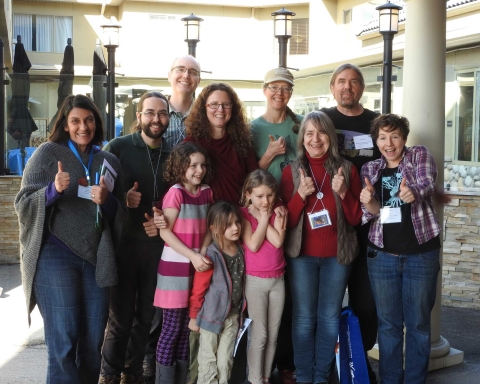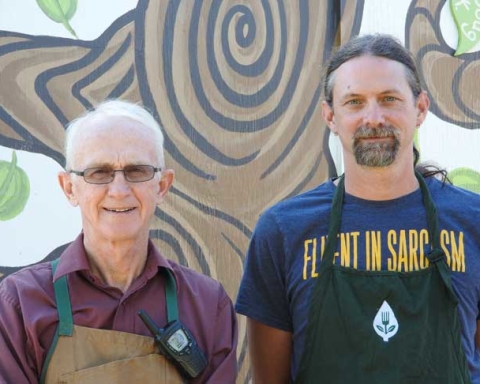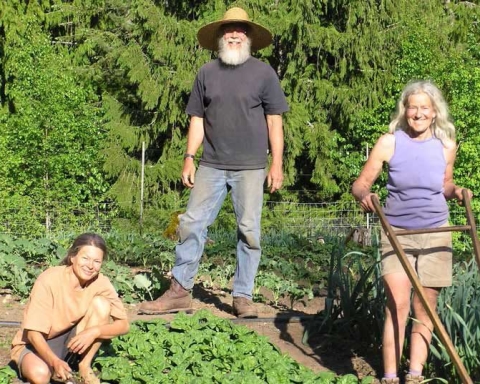Hannah Roessler
Stepping Up to the Challenge
The wind was quiet and the sun was shining as I headed down William Head Road towards Wind Whipped Farm in Metchosin on the southern tip of Vancouver Island. I was on my way to meet Alex Fletcher and Virginie Lavallee-Picard, the two dynamic and incredibly sweet young farmers who are the proud owners and founders of Wind Whipped Farm.
Alex and Virginie met and became friends at Victoria’s Pearson College where they were both students. Soon afterwards, they attended the College of the Atlantic in Maine, a small alternative school that focuses on Human Ecology, and is home to a 7-acre organic farm.
[bsa_pro_ad_space id=1]
“I’m not from a farming background. I’m more of an opportunist,” laughs Virginie. “I was more interested in free veggies than the actual idea of farming.” However, one year working on the farm led to another. In her third year, she moved on to the farm and, it became clear that Virginie was hooked.
Finding His Way Back to the Farm
Alex didn’t consider farming a realistic career path. “I never really considered it as an option. My parents had come from farming families in Saskatchewan and they sort of saw it as a dead-end with the increasing expansion of industrial agriculture, along with a heavy workload and low income.” But despite his family history, Alex got involved in farming at the College, feeling it would give him more clout in his interests in Environmental Policy to have experience working on an organic farm. Something tells me that having the chance to work with Virginie out in the fields wasn’t too bad either.
With a strong love for food systems, the environment, and each other, they moved back to Metchosin to Alex’s parents’ property, trying to decide their next steps. They secured a contract with Pearson College to research the viability of incorporating more locally grown produce into the cafeteria at the school. It proved to be a crucial turning point for these two farm-dabblers, as a result of a conversation with Tom Henry, the editor of Small Farm Canada Magazine. As Virginie remembers, “He said that if we want the college to have more local produce, we should grow it ourselves.”
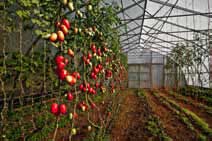

“He outright challenged us. If you want it, then do it!” Alex laughs at the memory. “He even said that he would come by to give us advice on a good location and till up my parents’ land so we could get started.”
Reflecting on this conversation spurred these two thoughtful environmentalists to consider their options. They realized that one of the largest barriers to accessing local food in their community was the lack of people growing it. They had access to land, an existing cabin on the land that they could fix up, cheap rent and a deep love for working outside. And they already had some farming experience under their belt from their time at College of the Atlantic. It seemed as though it couldn’t be easier to make the transition to farming!
Farming: A Five Year Plan
They broke ground in 2008, and through to 2009 engaged in what they call “part-time, super-low-budget farming.” “It’s hard to know just what we were doing back then,” says Alex as they both laugh. Certainly there was a lot of trial-and-error, but they did manage to produce a yield and delivered their produce by bike trailer to their local market.
[bsa_pro_ad_space id=1]
In 2010 they took to the road on their bikes to tour farms of eastern Canada, learning how other farmers were “making it work.” They eagerly absorbed all the farming tips they could, from different ways to clean salad mix to how to build a whizbang garden cart. They found the opportunity to learn from others invaluable, and returned home eager to continue working on Wind Whipped and implement some of their new-found knowledge. They started out with a 5-year plan and began investing in infrastructure—greenhouses, fencing, rototiller, a truck—all the pieces that they needed to be successful in their venture.
In 2011 they began The Local Food Box Program. Members pay $425 for a 16-week veggie box program. The boxes are delivered to two dropoff locations in Victoria or available for pick up on the farm. Wind Whipped also works with partners from Parry Bay Sheep Farm, Stillmeadow Farm, Winter Creek Farm, Ridgeview Farms and SRS Farms to offer a meat box option containing pork, chicken and lamb, and/or an egg option. They feel that this type of collaboration really adds value to their operation, and as Alex explains, “We access a larger group of customers, and create another local marketing opportunity for a few Metchosin producers. It’s great to be able to partner with other farmers in this way.”
In Search of Community
The land of Wind Whipped Farm is a gorgeous and peaceful 10-acre parcel on the ocean, worth far more today than when it was purchased in the early 80s. For new young farmers starting out, it might seem as though Alex and Virginie have everything they need to be successful—but it’s still not easy. As Viriginie explains, “we are so very lucky compared to others, but we still have land and housing barriers. We can’t have housing for workers, and our cabin is more of a seasonal dwelling than a home. Farm-worker housing is really needed.”
And more than that, they are lacking in what they really need: a strong agricultural community. Alex explains that, “We just don’t feel as though we are quite part of a thriving agricultural community. There are a few really big pieces missing. There are some great farmers around, but not a lot of young farmers who can continue the farming tradition in this area, because prices are so high. Also, there is no Agricultural Community Plan, something that we sorely need.” Virginie agrees. “How do we have conversations around keeping new farmers in Metchosin? As far as I know, this conversation isn’t happening at the municipal level. If we value the agricultural landscape, we need to actively support new growers to live here.”
If we value the agricultural landscape, we need to actively support new growers to live here.”
After a wonderful morning full of interesting conversation, I stroll up the hill from their cabin and leave the farm, loaded with squash, garlic and tomatoes. It’s clear to me how the problems these two have outlined can spell trouble for a future generation of farmers in this community. But it’s also clear how lucky Metchosin is lucky to have these articulate and motivated young farmers to help point things in the right direction.
Hannah Roessler has farmed in Nicaragua, Washington, and BC on permaculture famers, polyculture cafetals, organic market farms and a biodynamic vineyard. She has an MA in Environmental Studies, and her research is focused on climate change and small-scale organic farming. She currently farms on the Saanich Peninsula on Vancouver Island.


